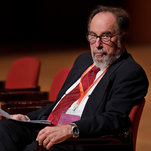
David Baltimore, the renowned molecular biologist and Nobel Prize laureate, passed away on April 15, 2021, at the age of 87. His groundbreaking work transformed the understanding of retroviruses and significantly contributed to the field of virology, including the study of the Human Immunodeficiency Virus (H.I.V.).
Born in 1934 in New York City, Baltimore’s scientific journey began at Harvard University, where he earned his doctorate in 1964. By the age of 37, he had already achieved a remarkable feat that would challenge existing biological theories. His research on retroviruses led to the discovery of reverse transcriptase, an enzyme crucial for understanding how certain viruses replicate within host cells.
Baltimore’s contributions extended beyond his own research. He played a pivotal role in shaping scientific policies and promoting the importance of scientific research in society. His tenure as president of the American Association for the Advancement of Science from 2007 to 2009 underscored his commitment to elevating public understanding of science.
As a professor at the California Institute of Technology (Caltech), Baltimore mentored countless students, fostering a new generation of scientists. His dedication to education and research earned him accolades and respect within both the academic community and the public sphere.
Throughout his career, Baltimore’s work had far-reaching implications, particularly in the fight against H.I.V./AIDS. His discoveries laid the groundwork for the development of antiretroviral therapies, which have transformed the lives of millions living with the virus. The impact of his research continues to resonate in ongoing efforts to combat infectious diseases globally.
Baltimore received numerous awards and honors for his scientific achievements, including the Nobel Prize in Physiology or Medicine in 1975, which he shared with fellow researchers Howard Temin and David Baltimore. This recognition solidified his status as a leading figure in molecular biology.
Colleagues and friends remember him not only for his scientific contributions but also for his warmth and generosity. Many have shared their condolences and fond memories, highlighting his influence as a mentor and supporter of scientific inquiry.
His passing marks a significant loss for the scientific community and for all who benefited from his work and vision. As we reflect on his legacy, it is clear that David Baltimore’s contributions will continue to inspire future generations of scientists and researchers striving to unravel the complexities of biology and disease.






